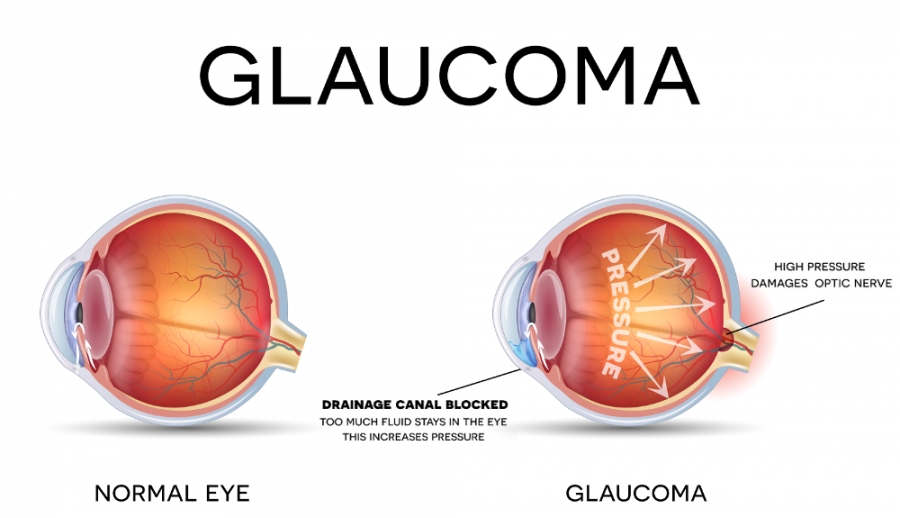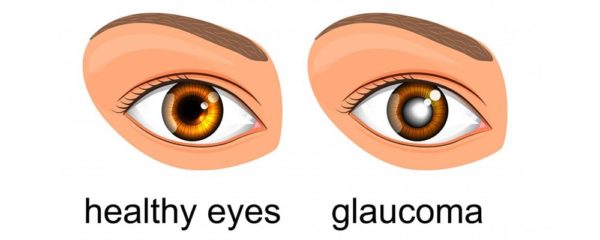Glaucoma
Glaucoma is a group of eye conditions that damage the optic nerve, the health of which is vital for good vision. This damage is often caused by an abnormally high pressure in your eye. Glaucoma is one of the leading causes of blindness for people over the age of 60. It can occur at any age but is more common in older adults.

Glaucoma Symptoms
- Patchy blind spots in visual feiled.
- Tunnel vision in advanced stages.
- headach, eye pain,blurred vision,eye redness in Acute glaucoma.
Risk factors

Treatment
Postoperative Glacuma surgery care
- Eye Protection
After surgery,use a protective plastic shield for 2 to 3 weeks to protect the eye and prevent any impact to the eye. You can use glasses during the day. The plastic shield is washable. Rinse it daily with soap and water and then put it on your eyes.
- Avoid rubbing and pressing your eyes.
- Mild postoperative pain can be reduced by acetaminophen prescribed by the physician.
- Travel after surgery
Traveling with car, train and plane is allowed after the surgery.
- Praying
From the day of operation, praying with tayammum is only allowed on the stone. However, do your prayers in a sittingposition up to one week and avoid prostration and approach the Turbah with hand to your forehead.
- The activities limitation depends on the type of surgery.
- After the surgery, sleep on your back. Do not sleep by the side of the eye that is operated and avoid sleeping in the prone position.
- Avoid coughing, sneezing, sudden and intense shaking of the head and do not push when defecating.
- Avoid doing hard work and lifting heavy objects after the operation.
- Study, watching television and usual activities of life not associated with intense physical activity are allowed.
- Postoperative Bathing
Ask your doctor for bath time or you can get a bath after the fifth day by your doctor’s advice. But keep the eyes closed when washing your head and face and do not put pressure on the eyelids at all.It is better to use a baby shampoo.
- Diet
On the night of the operation day, a light diet (soups and vegetables) and liquids is preferable to use. If you have a specific diet, continue the same diet after the surgery.Prevent constipation by eating the right amount of vegetables, fruits and water.
- Taking previous medication
Continue your previous medications according to the previous procedure. Consult with your doctor about taking ASA (aspirin) and anticoagulants (warfarin).
- Use of cosmetics
Strongly avoid the use of cosmetics (mascara, synthetic eyelashes, colored lenses, oily materials, etc. around the eyes) and ask your doctor when you can begin again to use them.
Ask your doctor for the time to start driving, using the pool and hair coloring.
- Glasses
If the cataract surgery with a lens is successful, you will need a near vision glasses to do close tasks and study after the surgery, which should be consulted with the doctor.It is worth mentioning that sometimes you need glasses for the far sight as well.
- Correct use of eye drops
First, wash your hands thoroughly with soap and water. Bend your head slightly back, pull your lower eyelid down with your pointer finger to create a small hole. Drop a droplet in the created hole. Avoid the contact of the dropper with hands or the edges of the eyelids. After dropping the drop, keep your eyes gently closed for two to three minutes. This will help to better absorb of the medicine and reduce its effects. If you need to use two different drops at a time, make an interval of at least five minutes between them. At intervals of sleep (5-6 hours), you do not need to wake up for using the drops. In your medication (eye drop)finished before your doctor appointment and before completing the course of treatment, you can recycle it from the pharmacy.
- After opening the eye drop lid, you should throw it away three weeks to one month later.
- If your eyelids stuck together, drop a few drops of chloramphenicol (CHLOBIOTIC) on them and clean the softened secretions with a sterilized gauze (a sterile lace-like texture that you can get from the pharmacy) without making any pressure to the eyeball.
- Take your ophthalmic medicines every time you visit your doctor.
- Natural symptoms
The ocular symptoms that are mentioned are not normal and not concerning: Mild redness, mild runny eye, mild blurred vision, foreign body sensation and short eyelid dropping.These symptoms gradually disappear within 4 to 6 weeks after the surgery.
- Attention to abnormal eye symptoms
In general, we expect blurred vision and eye discomfort in the post-operative days tend to recovery. But in case of worsening or confrontation with symptoms such as permanent pain, persistent sensitivity, increasing redness, decreasing visibility, severe nausea and vomiting, pussy secretions, severe irritation in the days after surgery, immediately visit your doctor.If you do not have access to your doctor, you can go to the Eye Hospital (Farabi, Labafi-Nezhad, Torfeh, etc.).
